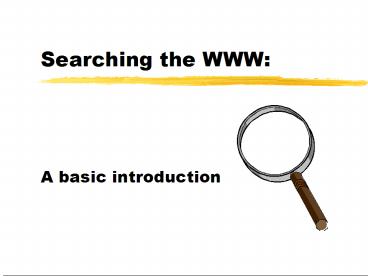Searching the WWW: - PowerPoint PPT Presentation
1 / 21
Title: Searching the WWW:
1
Searching the WWW
- A basic introduction
2
What is a search engine?
- Search engine
- Crawls the web automatically
- Directories
- Humans review site descriptions
- Hybrid search engines
- Some search engines maintain a directory
3
Parts of a search engine
- Spider, crawler
- Index, catalog
- Search engine software
- The same, but different
4
Search engine features
- Search engine features for webmasters
- Crawling
- Indexing
- Ranking
- Spam
5
The same but different
- Florida ecosystems
- Alta Vista
- Excite
- Hotbot
- Lycos
- Metacrawlers
- Northern Light
- Yahoo
6
Search Engine Math
- Works on nearly all search engines
- Be as specific as possible
- Addition floridaecosystems
- Multiplication
- florida ecosystems
- Subtraction florida ecosystems-everglades
- Combinations
7
Advanced Searching
- Search Features Chart
- Title searching (AV, Hotbot, Northern Light)
- Site search (Hotbot, AV, Lycos)
- Wildcards (AV, NL, Yahoo)
- Date Range (AV, HB, NL, Yahoo)
- Search w/in (Go, Lycos, HotBot)
- Boolean (AV -advanced, Excite -uppercase)
8
Bookmarks
- How to organize resources
9
Kid Search Engines
- Search Links
10
Misconception
- Too many educators believe that embedding links
to other web sites in text is good instruction.
So much hype has been associated with the WWW
that many educators seem to have lost sight of
the most important issue - learning. - Jonassen, 2000, p. 176
11
Issues
- Learners easily get off-task, thus, learning
goals are lost - Learners have difficulty integrating new
knowledge with existing knowledge - Learners have difficulty synthesizing new
knowledge into meaningful communication
12
Intentionality
- A self-regulated learner who keeps his or her
information-seeking goals in mind and makes good
decisions can find the WWW an essential
information resource during intentional learning.
That is the educational secret to the Internet -
intentionality. - Jonassen, 2000, p. 176
13
Mindtools
- Require students to think in meaningful ways and
represent what they learned - Typically requires collaboration
- the most effective uses of computers in
classrooms are for accessing information and
interpreting, organizing and representing
personal knowledge (Jonassen, 2000, p. 4)
14
The WWW as a Mindtool
- Make a plan
- Use tools or strategies
- Evaluate usability of information
- Critically evaluate information
- Collect information, use for intended purpose,
attribute authorship - Reflect on activity
15
Make a plan
- Students should clearly articulate what kind of
information they are searching for - Students should develop a search strategy
16
Make a plan - example
- How was King Tuts tomb excavated and what other
tombs are in the Valley of the Kings? - Concept block diagram
Who Where When What King Tut Egypt ancient
tomb King Egyptian historical burial Tutankh
amen Valley of Kings old grave
Tutankhamen Cairo history crypt
17
Make a plan -example
- Search strategy
- ((king (tut OR tutankhamen) AND egypt OR (valley
NEAR kings) OR cairo) AND (ancient or histor OR
old) AND (tomb OR burial OR grave OR crypt)
18
Evaluate usability of information
- Does the information support the written purpose?
- If yes, searching stops for now
- If no, narrow search, expand search or start again
19
Critically evaluate info.
- 1970s critical viewing curricula advocates
- Neophytes in the high-tech world often mistake
downloading for thinking (Healey, 1998, p. 251)
20
Collect, use, attribute
- Collect by copying and pasting with quotes,
paraphrasing, interpreting - Triangulate with other sources
- Properly attribute authorship
- Organize information through bookmarks or other
strategies
21
Reflection
- Should be continuous not formative
- Are we achieving our goals?
- Should we change our search strategy?
- What are we learning?
- What are we learning about collaboration?































